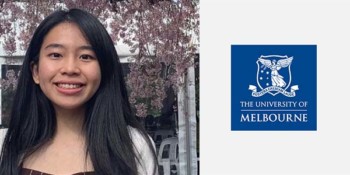Ru Hui Foong was a participant in the 2022 Virtual Development Studies Professional Practicum. Ru is studying a Bachelor of Arts at The University of Melbourne. Ru received a $3000 New Colombo Plan mobility grant to support his participation on this program.
Q: Why did you decide to undertake the ACICIS program?
I decided to undertake the program because I was drawn to the “full package” experience offered and believed that the teaching / academic components would complement and enrich my time with my host organisation – and they definitely did! As a Bachelor of Arts (Geography / Development Studies) student, I have also been interested in how development sector organisations in Indonesia operated and this program offered a unique opportunity to be able to intern with one.
Q: Did you receive a New Colombo Plan Mobility Grant? Do you think the NCP is an important initiative?
Yes, I received a NCP mobility grant. I believe the NCP is an important initiative as it makes it more accessible for students to gain more knowledge and build connections in the Indo-Pacific.
Q: How have you found the academic components of this virtual program – i.e. the language classes/seminars?
The language classes were really fun and I was surprised by how much we learnt in the short amount of time. The small class size made it a comfortable learning environment and allowed for quality engagement with the tutor and fellow students.
The seminars covered a diverse range of topics which made each seminar feel fresh and exciting. Well-curated and complementary to each other, the range of topics provided solid foundations for developing a holistic understanding of Indonesia.
Q: What organisation did you intern with?
I interned at The SMERU Research Institute. The project that I worked on was under the Institute Secretariat Division, which involved designing and carrying out an internal review of the organisation’s Child Protection Policy (Kebijakan Perlindungan Anak).
Q: How have you found the work culture (albeit online) of your host organisation? How is it different to work experience in Australia?
As compared to the Australian workplace, I found the Indonesian workplace to be more casual and flexible. This was particularly apparent from how we scheduled online meetings through a messaging app and how there was often no fixed end timings for meetings. It did take some time getting to used to a different work culture but the staff at my host organisation were very welcoming and supported me greatly in acclimatising to the norms.
Q: What are the key skills you have learnt during your virtual internship?
As I was given a lot of autonomy and support from the team at my host organisation to focus on tasks that interested me most, I was able to work on the skills that I sought out to develop when I was first signing up for the program, which were my research skills, analytical skills and cross-cultural communication skills.
Q: What did you find to be the more rewarding part of this virtual program?
The most rewarding part was experiencing personal growth in terms of developing greater confidence in navigating cross-cultural environments over the course of the virtual experience.
Q: Were you able to learn about the Indonesian culture from this virtual program? If yes, how was this achieved?
The opportunity to learn about the Indonesian culture was featured in all components of the virtual program. The academic seminars helped me develop a more “formal” understanding of the socio-political context of the country, while cultural activities (cooking class, movie screening) and social afternoon tea sessions where we had casual chats allowed me to learn more about popular culture and the everyday experiences of Indonesians. I was also able to gain valuable insight into the norms and culture of an Indonesian workplace through interacting with staff members at my host organisation during the internship.
Q: How will the virtual internship benefit or influence your future career?
The virtual internship imparted me with plenty of tacit knowledge on the development sector in Indonesia, as well as the Australia-Indonesia links in the development space. Considering the importance of the Indo-Pacific to Australia, I believe that this understanding will be highly valuable.
Q: Would you recommend this virtual program to your friends?
Definitely!
Q: Favourite Indonesian word/phrase:
Semangat
Q: Describe your experience of the virtual internship program in three words:
Engaging, enriching, exciting


